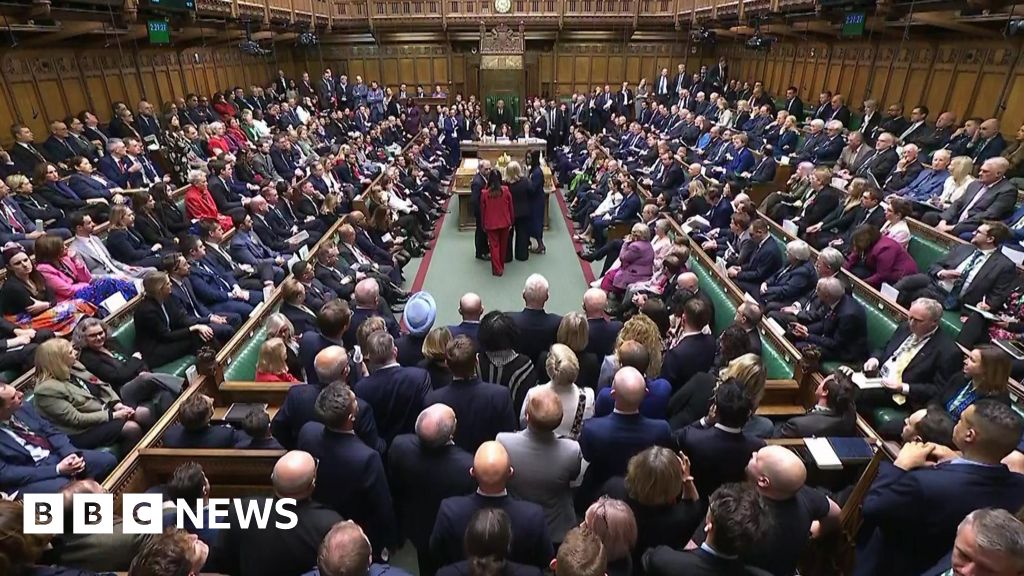In Westminster a lot of power is derived from patronage, as well as feelings of loyalty to a party, plus occasional warnings, threats and arm-twisting. Whipping is a central part of the British political system. Whips are the MPs in each party responsible for discipline and ensuring their colleagues vote the right way. And yet with two of the most consequential and controversial political debates of the year - both being voted on this week - MPs have been told they can do exactly what they want. On Tuesday, the House of Commonsvoted to decriminalise abortionin England and Wales - the most consequential change in reproductive rights in almost 60 years. And on Friday, MPs willdecide whether to legalise assisted dying,another complex issue spanning both the healthcare and justice systems with myriad legal and ethical challenges. Both issues are a "conscience votes" or "free votes" - meaning it is a matter for Parliament, not government, and MPs can follow their instincts. There was a sizeable majority of 242 in support of changing abortion law. The debate over assisted dying is much closer. When MPs last voted on the issue in November, there was a 55 person majority in favour of the change. Since then the BBC has discoveredsome are changing their minds. It has led to a rare situation when we see loyal cabinet ministers voting on opposite sides. Two of the most well-known politicians opposed to assisted dying - Health Secretary Wes Streeting and Shabana Mahmood, the justice secretary - are the very ministers whose departments will likely have to implement it if the change is approved. Prime Minister Sir Keir Starmer has done his best to stay out of these debates to avoid influencing his colleagues, and yet his support for both policies is still pretty well known. After this week's decision to decriminalise abortion, the prime minister said: "My longstanding position, in principle, is that women have the right to a safe and legal abortion and that has been my longstanding position." Since 2015 he has voiced support for some form of an assisted dying bill. And this week in Canada, Sir Keir hinted he would vote in favour of a law change. "My own position is long-standing and well-known in relation to it," he said. "Based on my experience when I was chief prosecutor for five years, where I oversaw every case that was investigated." For politicians of all parties this week's votes are a political peculiarity. Some say they find the space to explore this issues liberating and exhilarating. Others seem a little uncomfortable - surprising though it sounds - about the loneliness of having to make up their own minds. Sign up for our Politics Essential newsletterto keep up with the inner workings of Westminster and beyond.
Two huge issues - and MPs are making up their own minds
TruthLens AI Suggested Headline:
"MPs Face Conscience Votes on Abortion Decriminalization and Assisted Dying Legislation"
TruthLens AI Summary
In Westminster, the traditional power dynamics of party loyalty, patronage, and the influence of whips are being challenged as Members of Parliament (MPs) confront two highly significant and contentious issues: the decriminalization of abortion and the legalization of assisted dying. This week, MPs were granted the freedom to vote according to their personal beliefs rather than party lines, a situation referred to as a 'conscience vote' or 'free vote'. On Tuesday, the House of Commons made a landmark decision to decriminalize abortion in England and Wales, marking the most substantial shift in reproductive rights in nearly six decades, with a notable majority of 242 in favor of the change. In contrast, the upcoming vote on assisted dying is expected to be much closer, reflecting a more divided opinion among MPs. The complexity of assisted dying intertwines healthcare and ethical considerations, making it a challenging topic for parliamentarians to navigate. The last vote on this issue in November revealed a slim majority of 55 in favor, but recent reports suggest that some MPs are reconsidering their positions, adding to the uncertainty surrounding the forthcoming decision.
The political landscape surrounding these votes is further complicated by the presence of prominent cabinet ministers taking opposing stances on assisted dying. Health Secretary Wes Streeting and Justice Secretary Shabana Mahmood, both of whom are against the proposed change, would be responsible for implementing the law should it pass. Prime Minister Sir Keir Starmer has opted to maintain a degree of distance from these debates, aiming not to sway his colleagues' opinions, despite his well-established support for both issues. He reaffirmed his advocacy for women’s right to safe and legal abortion and his long-standing position on assisted dying, based on his experiences as chief prosecutor. The current situation has created a unique political environment where MPs are grappling with the responsibility of making independent decisions on moral issues, leading to mixed feelings of liberation and discomfort as they navigate these consequential votes.
TruthLens AI Analysis
You need to be a member to generate the AI analysis for this article.
Log In to Generate AnalysisNot a member yet? Register for free.
